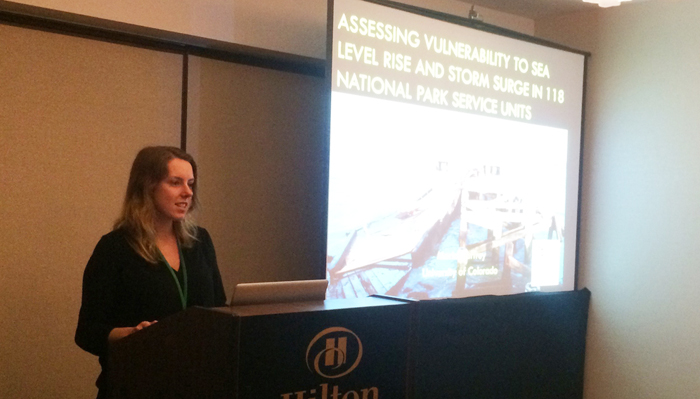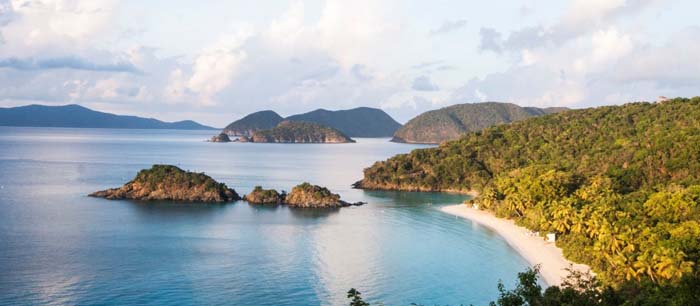
Maria Caffrey’s Climate Research Website. Photo by Patrick Gonzales.
For several years, climate change scientist Maria Caffrey led a trailblazing study outlining the risks of rising seas at national parks. An administration crony fired her
By Skip Clement
[dropcap]W[/dropcap]e would be considered naive if we didn’t think new administrations didn’t make sure the voices of agencies it appoints “friends” to manage won’t follow a president’s agendas. Those intercepts have always been practiced for what “they” perceive as better for the people and the country. It was always that way, and should always be that way, but it never was nor never should be a thug telling crooked fools, who are chosen to run the agencies, that they need tell underlings to lie, disregard science, muzzle scientists, hide discoveries that would protect or warn citizens of impending disaster.
This administration has not only trampled environmental responsibility, but it also goes beyond – it threatens scientists with vicious reprisals or terminates them
These outings would not come to our attention if they were not directly opposed to the health of our fishing and hunting lands, climate effects on waters we fish and the fish that are sustained by those same waters.
So that it’s not just an idea of this lowly scribe, read the flavor of what muzzling intellectual thought tastes like to hard-working, smart scientists caught in the Trump wheel of misfortune.
Maria Caffrey, what did your work involve?
“I was studying how climate change will affect 118 coastal parks in the US for the National Park Service. I started this work in July 2013; it was my baby.”

Aerial view of Trunk Beach at Virgin Islands National Park. NPS photo. Caffrey’s climate change reports are hidden from the public.
What changed under the Trump administration?
“My study went through peer review and was ready to be released, but I was told by the NPS a few days after Donald Trump’s inauguration that they were ‘waiting for messaging’ first. I thought that was no big deal, but then nothing happened, and I started calling up every few weeks to say, ‘We’ve got to get this out, it’s getting stale.’
“The excuses varied but became ever more vague, such as ‘we are ever so busy’ or that it would worry people during hurricane season because it mentions storm surge in coastal areas. A superior said they wanted to keep a low profile on climate change for four or maybe eight years while Trump was around, which really upset me because we don’t have four to eight years to do nothing. I felt I was being silenced.
“I went on maternity leave around Christmas 2017, and the report still hadn’t been released. I got an email from a colleague saying, ‘Congrats on the baby, by the way, you should know they are editing your report.’
“We had a conference call, and it became clear that any mention of human-caused climate change had been taken out. I was asked how I would feel if “they” didn’t release the report at all, which felt like a threat. I stood my ground and was told ‘they aren’t going to be happy about this from above.’ It was never clear who ‘they’ were – perhaps Trump himself or Ryan Zinke [the then Secretary of the Interior].
“I then had a meeting with a senior NPS official who came out from Washington DC. The other report co-authors were there, too. That’s when it all unraveled, it became incredibly hostile. I was told not to attribute changes in public lands to human actions.
“I felt like we worked for the American people, and I didn’t want to lie to them. But a superior said that we, in fact, work for the executive branch of which the president is the head. The president is the boss, and we are going to put our heads down and put out the line of the administration.
“A journalist did a freedom of information request and saw all the emails of us fighting over this and asked me for a statement. I ended up going on the record because I thought it was a very important issue. I was aghast I was being asked to lie. These people were violating the mission of the NPS.
“After I came back from maternity leave, I was demoted to be an intern on $25,000 a year. And then in February this year, they said there was no money left at all and that I would have to leave. It was devastating. I offered to work for free as a volunteer but was turned down, which shows that it wasn’t a money issue really. I packed up my office, and I was gone. I filed a whistleblower complaint in July.”
How do you feel about your experience?
“I have faced retribution; I was threatened and placed in a hostile work environment. It’s evident in some agencies there’s a culture of fear where scientists are being intimidated. When I wrote this report, politics was the last thing on my mind, I was thinking about climate change and these coastal parks.
“It’s very frustrating; it’s not where I pictured where my career would be at this time in my life. I don’t even know if I have a career anymore. What’s left is in tatters.”
Read about more scientists who stood up . . .

